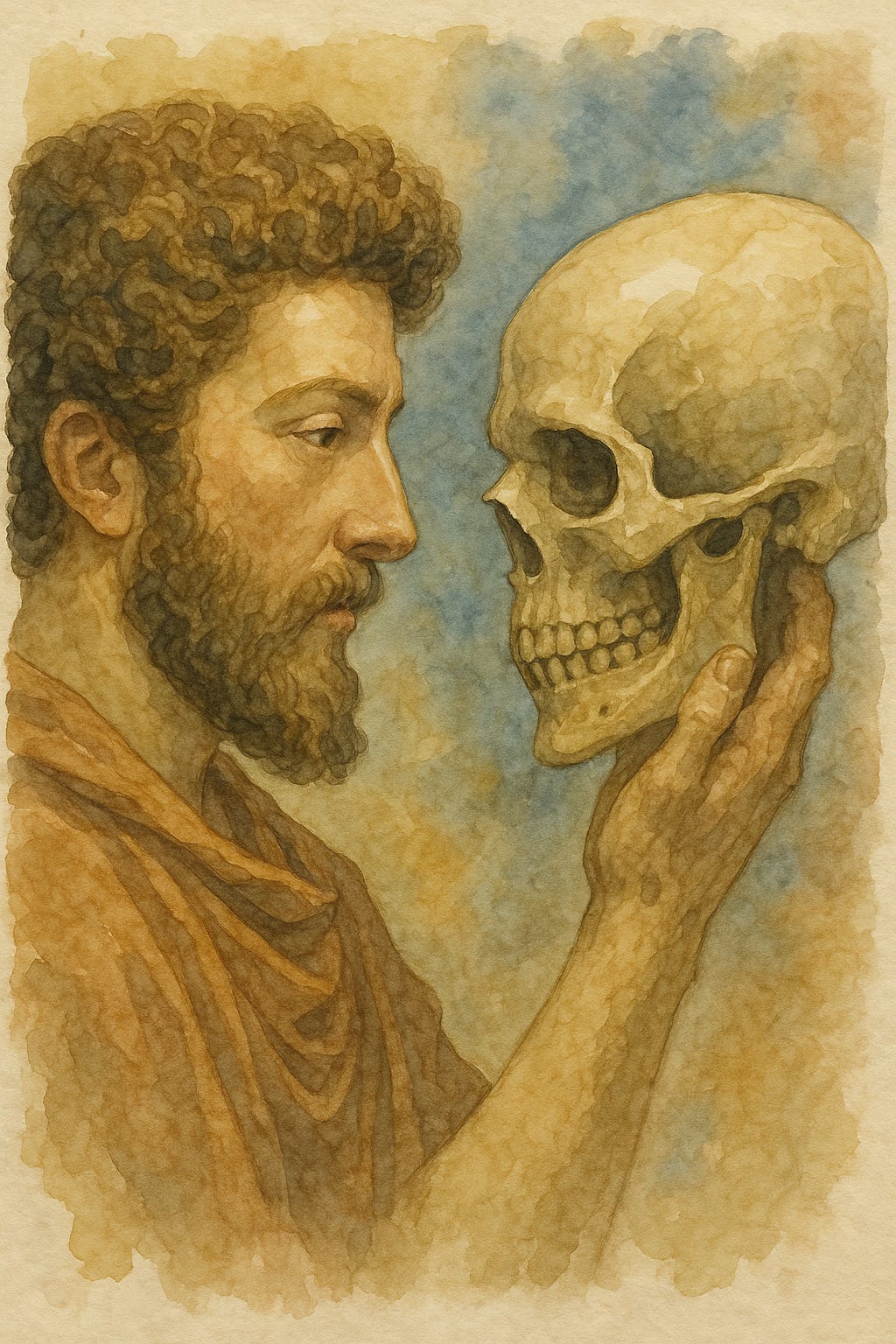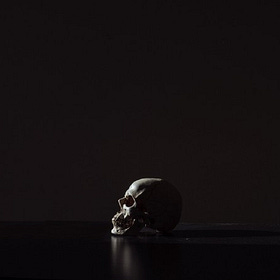Mind Candy is a newsletter on practical philosophy and human flourishment—aka how to live “the good life.” Each month we tackle a new theme.
Introduction to Monthly Theme
“It is the blight man was born for. We are not idealized wild things. We are imperfect mortal beings, aware of that mortality even as we push it away, failed by our very complication, so wired that when we mourn our losses we also mourn, for better or for worse, ourselves. As we were. As we are no longer. As we will one day not be at all.”
It goes by many names and many terms. The great equalizer. The pale rider. Meeting one’s maker.
But regardless of how we categorize it, death awaits each and every one of us.
It is hard to accept. It is painful to accept. When we’re young we feel immortal but as we age the reality of life creeps in and we begin to accept that we are no gods, we are but mere mortals here on this earth for a limited time.
Everything around us will at one point or another cease to be. As Marcus Aurelius reminded himself in Meditations:
“Bear in mind that everything that exists is already fraying at the edges, and in transition, subject to fragmentation and to rot. Or that everything was born to die.”
Still, it remains the greatest fear most of us have.
But it doesn’t have to be.
From the ancient schools of philosophy to religion and culture, we have created ways to not only discuss death but become more familiar with it, a way to accept the inevitability of it all.
For the month of July, we’re exploring the theme of mortality.
And we start by reviewing some of the exercises Marcus Aurelius reviewed with himself to accept his own mortality.
“You could leave life right now. Let that determine what you do and say and think.”
Death is a curtain that hangs over us all. It likely will not come down on anyone reading this today, but one day, eventually, it will for all of us.
It is scary. It is something none of us have ever experienced.
And yet, none of us remember life prior to our birth. It is a void—a void of nothingness.
We did not exist and knew nothing.
The Stoics believed death to be very similar. There is life and then there is the cessation of it.
In order to better grapple with our mortality and the existential dread that inevitably hangs over all of us at times, below are five tactics the Stoics used to not only accept death, but embrace our literal existence, and in turn, the death that comes with it.
Treat today like it is your last
It’s easy to say live in the present moment, it is another to actually do it.
We are inundated daily with things that tell us to think outside the present moment—work priorities that are due, plans to be made, events to attend.
And yet, none of that is completed or attended to without the present moment. Each moment is here and then gone, whisked away before we could even notice it was there.
So in an effort to hold onto the present moment, the Stoics preach about turning our attention to virtue.
Rather than worrying about deadlines, take a step back and imagine today is your last day.
Reflect upon that.
Tomorrow will not come. You will not get to say anything further to family or friends, you will not get the promotion you hoped for.
Instead you have today to be the very best version of yourself. You have the chance to be the perfect individual you always hoped to be.
Now open your eyes and embrace the day, regardless of if it is your last, the same way.
As Marcus Aurelius reminded himself:
“Perfection of character: to live your last day, every day, without frenzy, or sloth, or pretense.”
Contemplate your own death
We don’t like death. It is the great unknown to us. So we avoid it. We don’t talk about it, we pretend it doesn’t exist, that it is far off.
And it likely is for the majority of us. But that doesn’t mean we should avoid thinking about it.
Burying our heads in the sand has never done anyone any good.
Instead, the Stoics thought it an important practice to contemplate the end, to reflect upon it and embrace it.
Yes, it is scary, but it is also going to happen whether we fight it or not. The more we reflect upon it, the more comfortable we become with it.
“Think of yourself as dead,” Marcus reminded himself. “You have lived your life. Now take what's left and live it properly.”
Use your reflection on death as fuel to propel you for life. Let it be the ultimate reminder that your actions count, and that they are limited in how many you get.
Don’t waste them.
We’re in constant transition
“Grapes. Unripe...ripened...then raisins. Constant transitions. Not the "not" but the "not yet."”
We spend the first 25 years or so on an upward trajectory of growth. But after that, we stop growing, at least physically, and begin a maintenance before the decline phase hits.
When we’re young and healthy, we think we’re invincible. It’s only when we begin to hit middle age that we understand the reality of our mortality, that we are like all who came before us.
We are not gods but rather mere mortals set to decline as well.
Each part of life brings forth different enjoyments. Rather than bemoaning the stage we’re in, we should look to embrace it, grabbing every aspect we can.
Life is a continuous lesson and with it the knowledge of the world waiting to be grasped.
You choose the ending
The end will come for all of us. It doesn’t matter whether you are the richest man in the world or the poorest, death awaits you and will take you.
We therefore have a choice when the time comes:
We cling to life, denying our mortality and fighting for a few more seconds, or we can accept our fate and fade gracefully.
But when we’re dying we don’t think of this dichotomy, we instead make bargains for more time.
As Marcus Aurelius reminded himself:
“If it's time for you to go, leave willingly - as you would to accomplish anything can be done with grace and honor. And concentrate on this, your whole life long: for your mind to be in the right state - the state a rational, civic mind should be in.”
If we’ve lived our life properly, filled with virtue, humility, and grace, then when the end comes, it is no longer a fight for a few more seconds. Rather, it is a practiced acceptance of the inevitable nature of life.
You are returning home
In Stoic philosophy, everything is connected to one another. We are born from the collective and when it is time, will pass back to it. There is a constant ebb and flow of birth and death, being created from the universe and once again returning to it when the time comes.
By keeping this in mind, we not only learn to relinquish our fear of death, we can begin to embrace it as a homecoming.
“Death: something like birth, a natural mystery, elements that split and recombine,” Marcus reminded himself.
Death is the incredibly scary and sends us into existential dread. But when we reframe our thoughts around it, when we reflect and understand it is a natural part of life, we begin to wear away at the sharpened edge of the idea of death and instead learn to accept its inevitability.
Before you go…
If you enjoyed the above article, you may be interested in the below one:
Thank you for reading Mind Candy. If you enjoyed this work, please consider upgrading to a paid subscription. Or if now isn’t the right time, please share to someone who could benefit.
Until next time,
D.A. DiGerolamo
We are a participant in the Amazon Services LLC Associates Program, an affiliate advertising program designed to provide a means for sites to earn advertising fees by advertising and linking to Amazon.com.








